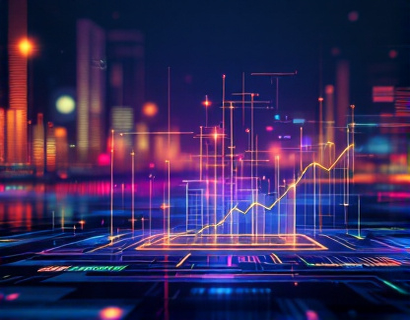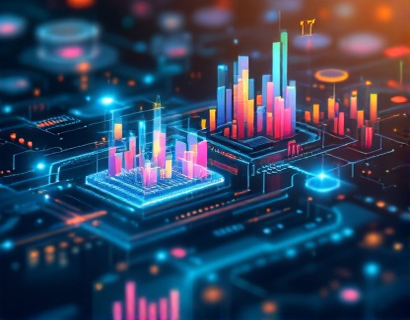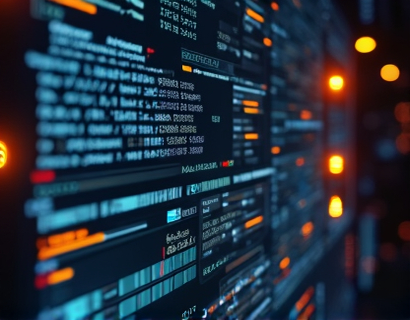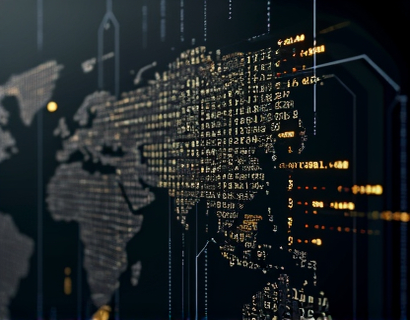The Convergence of AI and Crypto: Revolutionizing Financial Services
The intersection of artificial intelligence and cryptocurrency is ushering in a new era of financial innovation. This convergence is not just a technological curiosity but a transformative force that is redefining the landscape of financial services. As we delve into this topic, it's essential to understand the fundamental roles that AI and crypto play individually and how their union is creating unprecedented opportunities in the digital realm.
Artificial intelligence, with its ability to process vast amounts of data at unprecedented speeds, has become an indispensable tool across various industries. In the financial sector, AI has been leveraged for everything from fraud detection to algorithmic trading. Its predictive capabilities and pattern recognition skills make it a powerful ally for financial institutions seeking to stay ahead in a competitive market.
Cryptocurrency, on the other hand, represents a paradigm shift in how we think about money and transactions. Born out of the need for a decentralized, transparent, and secure form of currency, crypto has gained significant traction since its inception. The underlying blockchain technology ensures transparency and immutability, making it an attractive solution for a wide range of applications beyond just digital currency.
The combination of AI and crypto is particularly potent because it harnesses the strengths of both technologies. AI can enhance the security, efficiency, and usability of crypto assets, while crypto provides a decentralized and transparent environment for AI algorithms to operate. This synergy is driving the development of intelligent crypto solutions that are reshaping digital finance.
Enhancing Security with AI
One of the primary concerns in the crypto space is security. Traditional financial systems have robust security measures, but the decentralized nature of crypto introduces new vulnerabilities. AI can significantly bolster security by detecting and mitigating threats in real-time. Machine learning algorithms can analyze transaction patterns to identify anomalies that may indicate fraudulent activity.
For instance, AI-powered systems can monitor blockchain transactions and flag suspicious behavior, such as unusual transaction volumes or patterns that deviate from the norm. These systems can adapt and learn from new data, continuously improving their ability to detect and prevent fraud. This proactive approach to security is crucial in maintaining trust in crypto assets.
Moreover, AI can enhance the security of crypto wallets and exchanges. By implementing biometric authentication and behavioral analysis, AI can ensure that only authorized users access sensitive information. This multi-layered security approach not only protects users' assets but also complies with regulatory requirements, which are increasingly focusing on cybersecurity.
Optimizing Trading Strategies with AI
Algorithmic trading has been a staple in traditional finance, but AI takes this to a whole new level. In the crypto market, where price volatility is the norm, AI-driven trading strategies can capitalize on fleeting opportunities. These algorithms can process vast amounts of data, including market news, social media sentiment, and historical price data, to make informed trading decisions.
Machine learning models, such as neural networks and decision trees, can identify complex patterns and correlations that human traders might miss. This capability allows for more precise and timely trades, potentially leading to higher returns. Additionally, AI can manage risk by dynamically adjusting positions based on market conditions, ensuring that portfolios remain balanced and resilient.
The use of AI in crypto trading also extends to arbitrage opportunities. By analyzing multiple exchanges simultaneously, AI can spot price discrepancies and execute trades to exploit these differences. This strategy can generate consistent profits, especially in highly liquid markets like crypto.
Improving User Experience through AI
Beyond security and trading, AI is transforming the user experience in the crypto space. User interfaces powered by AI can provide personalized recommendations and insights, making the complex world of crypto more accessible to newcomers. Chatbots and virtual assistants can answer common questions, guide users through transactions, and offer real-time support, enhancing the overall user experience.
Portfolio management tools driven by AI can analyze a user's financial goals, risk tolerance, and market conditions to suggest optimal asset allocations. These tools can also provide ongoing monitoring and adjustments, ensuring that users' portfolios remain aligned with their objectives. This level of personalized service is a significant step forward in making crypto accessible and user-friendly.
Decentralized Finance (DeFi) and AI
Decentralized Finance, or DeFi, is an emerging sector that leverages blockchain technology to create financial services without traditional intermediaries. AI plays a crucial role in enhancing DeFi platforms by improving lending, borrowing, and yield farming processes. For example, AI can assess creditworthiness more accurately by analyzing a broader range of data points, reducing the risk of default.
Smart contracts, which are self-executing contracts with the terms directly written into code, can be optimized with AI to ensure they function as intended and to detect potential vulnerabilities. AI can also facilitate more efficient and fair liquidity provision by matching suppliers and demanders based on real-time market conditions.
Furthermore, AI can help in predicting market trends within DeFi, allowing users to make informed decisions about when to enter or exit positions. This predictive analytics capability is particularly valuable in the highly volatile DeFi space, where timing can be everything.
Cross-Chain Interoperability and AI
As the crypto ecosystem grows, the need for cross-chain interoperability becomes increasingly important. AI can play a pivotal role in facilitating seamless interactions between different blockchain networks. By analyzing protocols and standards, AI can help develop solutions that enable assets and data to move freely across chains.
This interoperability is essential for building a more connected and efficient crypto ecosystem. AI can optimize routing and transaction processes, reducing costs and increasing speed. It can also enhance security by identifying and mitigating risks associated with cross-chain operations, such as smart contract vulnerabilities and network attacks.
Regulatory Compliance through AI
One of the biggest challenges for crypto is navigating the complex regulatory landscape. AI can assist in ensuring compliance by monitoring transactions and identifying potential regulatory issues in real-time. Machine learning algorithms can be trained to recognize patterns that indicate money laundering, tax evasion, or other illicit activities.
Regulatory bodies can also leverage AI to better understand and oversee the crypto market. By analyzing large datasets, AI can provide insights into market trends, risk factors, and compliance gaps. This data-driven approach can help regulators create more effective and targeted policies, fostering a balanced and secure crypto environment.
Future Prospects: AI-Driven Financial Innovation
The future of finance is undoubtedly intertwined with AI and crypto. As these technologies continue to evolve, we can expect even more innovative applications that further transform the financial landscape. One area of potential growth is the integration of AI with other emerging technologies, such as quantum computing and the Internet of Things (IoT).
Quantum computing, with its ability to process information exponentially faster than classical computers, could revolutionize AI's capabilities in finance. This synergy could lead to breakthroughs in areas like complex risk modeling, optimization problems, and cryptography. IoT devices can provide real-time data feeds that AI can analyze to make instantaneous decisions, enhancing the efficiency and responsiveness of financial services.
Another exciting prospect is the development of AI-powered financial advisors that can offer personalized investment strategies based on individual preferences and market conditions. These advisors can continuously learn and adapt, providing users with up-to-date and tailored advice. This level of personalization can democratize access to professional financial guidance, making it more accessible to a broader audience.
The convergence of AI and crypto is not without its challenges, however. Issues such as data privacy, ethical considerations, and the potential for increased market volatility need to be addressed. As the technology matures, it will be crucial to establish robust frameworks that balance innovation with responsibility.
In conclusion, the integration of AI and crypto is driving significant financial innovation, offering enhanced security, optimized trading, improved user experiences, and new opportunities in DeFi and beyond. As we look to the future, the potential for further advancements is immense, promising a more efficient, secure, and inclusive financial ecosystem.










































